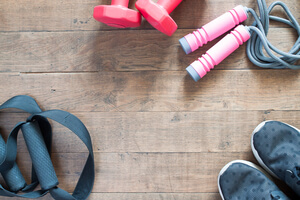Author: Emily Mendez, MS, EdS
Life after addiction rehab can be entirely different than it was before treatment. One of the challenges that you’ll face is how to fill your leisure time after quitting substance abuse. This guide will help you find positive ways to stay busy and enrich your life.
Sober Support Systems & Relapse Prevention
 Many people find it difficult to fill their time after becoming sober. People who are addicted to drugs or alcohol often spend a significant amount of their time getting, using, or recovering from using the drug.1 Once they are no longer using drugs or alcohol, boredom might set in if they don’t have things to fill their time. Apathy is a common relapse trigger for many people.2
Many people find it difficult to fill their time after becoming sober. People who are addicted to drugs or alcohol often spend a significant amount of their time getting, using, or recovering from using the drug.1 Once they are no longer using drugs or alcohol, boredom might set in if they don’t have things to fill their time. Apathy is a common relapse trigger for many people.2
One of the ways to prevent relapse and avoid boredom is to have a strong social support network. While you were in rehab, you likely had a support network of people who were recovering from drug or alcohol addiction. Once you are back home, you may no longer have the same support network. People that you previously used drugs or alcohol with may start coming around again. Being around people who use is a major trigger for relapse.2
If you are recovering from a substance addiction, it is essential to find a support network of people who do not use and will help you by providing encouragement and support when you need it the most. They can help you by providing a distraction when you experience a craving to use.2
Mutual support or self-help groups are a great option for people who are in substance abuse recovery. These groups help provide emotional and social support for people throughout their recovery journey.3 Mutual support groups are an excellent adjunct to professional treatment, as they help extend and complement the benefits of rehab.4
Popular types of support groups include:
- 12-step groups: Common 12-step groups include Alcoholics Anonymous (AA), which has more than 2 million members worldwide, and Narcotics Anonymous (NA). These spiritual groups are focused on helping the person achieve abstinence through peer support.3 Group members follow 12 core steps to recover from addiction. These groups emphasize helping others and sharing personal recovery stories with group members.
- SMART Recovery: SMART Recovery is a secular self-help program for people having problems with drinking and using drugs. However, substance abuse is viewed as a maladaptive behavior that can be modified using cognitive-behavioral approaches, rather than a disease. Unlike AA, the person is not seen as powerless to change their behavior. SMART Recovery provides the tools and evidence-based techniques to help a person recover from drug or alcohol abuse. It is up to the person to use those tools.5
- Women for Sobriety (WFS): This is a secular support group that was specifically designed for women. It was created as an alternative for 12-step programs, and includes Thirteen Statements designed to improve emotional and spiritual growth. Daily meditation is encouraged, although there is no mention of a Higher Power or God.3
Participation in mutual support groups significantly increases the likelihood of maintaining sobriety. The more that a person participates in these groups, the more likely they are not to use drugs or alcohol.3 Further, helping others by providing encouragement and guidance often helps you to remain sober.3
Support groups are an excellent way to enhance your recovery process after or while receiving professional treatment. Support groups also help fill your spare time and prevent restlessness or loneliness. In addition, they put you in contact with others who are sober and have similar recovery goals.
The Importance and Benefit of Giving Back
Mutual support groups emphasize helping others. Service is the foundation of AA 12-step groups. After a year of recovery, you might consider becoming a sponsor in a 12-step group since paying it forward is such a vital part of recovery. A large research study on alcoholics in AA found that individuals recovering from alcoholism who helped others during treatment were more likely to be sober in the following year.6
Another study indicated that about 94% of individuals with an alcohol addiction who helped others in recovery at any point during the 15-month study continued to help others after the study. Additionally, self-reports of depressive symptoms in helpers decreased significantly once they began helping others.6
Helping others provides a therapeutic benefit to the helper. When you help others, it helps you feel good about yourself. When you help someone with the same condition that you have, it can be even more beneficial. One study found that the benefits of assisting others double when a person helps someone else with the same problem.7
 In addition to serving as a sponsor in a 12-step program, you might want to consider volunteering for various organizations, such as charities or nonprofits in your community. Not only can you provide assistance to those who need it, but volunteering can also give you a sense of accomplishment. Volunteering provides both social and health benefits. People who volunteer have a higher functional ability, lower rates of depression, and lower mortality rates.8
In addition to serving as a sponsor in a 12-step program, you might want to consider volunteering for various organizations, such as charities or nonprofits in your community. Not only can you provide assistance to those who need it, but volunteering can also give you a sense of accomplishment. Volunteering provides both social and health benefits. People who volunteer have a higher functional ability, lower rates of depression, and lower mortality rates.8
Regularly volunteering with organizations and acting as a sponsor in a support group can fill your schedule and provide structure to your routine. Scheduling regular meetings and volunteering sessions ensures that you have less free time to accidentally slip back into drug or alcohol use.
Discovering New Hobbies
In the past, you probably used to spend the majority of your energy and time using drugs or alcohol. Now that you are sober, you should spend that time with hobbies and other things that you enjoy. Participating in healthy and fun activities can help to prevent relapse.
Using your time wisely also helps you avoid boredom, anger, stress, and other negative emotions that may have previously contributed to your substance use. It allows you to avoid trouble by staying busy and engaging in things that make you happy.
So, how do you find hobbies and activities you enjoy? The first step is to assess your strengths and preferences. What are you good at? What do you like?
You may want to rate your skills on a scale from 0 to 3, with 0 being “Not at all like me” and 3 being “Very much like me.” These may include:9
- Creativity.
- Sense of humor.
- Politics.
- Physical ability.
- Survival skills.
- Persistence.
- Intelligence.
- Ability to connect with people.
- Ability to help others.
- Communication skills.
- Ability to manage negative feelings.
Identifying some of your strengths as well as what you enjoy doing can help you find the best hobbies or activities for you. For example, if you have a good sense of humor and like to laugh, you might consider participating in a local improvisation group or doing stand-up comedy. You can make new friends and do something that you enjoy.
Some other ideas for activities and hobbies include:9
- Learning to play an instrument.
- Joining a sports team.
- Painting or drawing.
- Swimming.
- Surfing.
- Rock climbing.
- Writing stories.
- Joining a poetry reading group.
- Gardening.
- Photography.
- Cooking.
- Singing or dancing.
Sometimes you’ll find that the hobbies you enjoy, such as playing soccer or swimming, involve exercise. Exercise is an important part of addiction recovery, as it can help to heal some of the damage caused by drug or alcohol abuse. Nutrition is equally as important, as it can promote physical and emotional health.
Exercise & Eat Well
 Substance abuse can harm both the mind and the body. People who abuse alcohol or drugs often have severe nutritional deficiencies. Addiction can result in severe lifestyle changes, such as poor diet and irregular meal times. Also, addiction can lead to gastrointestinal issues that can further impair hydration and nutritional status. For example, nausea and vomiting are common in opioid withdrawal, which emerges when someone abruptly quits abusing opioids. Severe vomiting can cause dehydration and electrolyte imbalances.10
Substance abuse can harm both the mind and the body. People who abuse alcohol or drugs often have severe nutritional deficiencies. Addiction can result in severe lifestyle changes, such as poor diet and irregular meal times. Also, addiction can lead to gastrointestinal issues that can further impair hydration and nutritional status. For example, nausea and vomiting are common in opioid withdrawal, which emerges when someone abruptly quits abusing opioids. Severe vomiting can cause dehydration and electrolyte imbalances.10
Proper nutrition is essential for your well-being. The foods that you put in your body affect how you feel—both mentally and physically. Adequate nutrition helps the body fight infection and provides energy for daily tasks.10 Therefore, it is essential to pay attention to diet as you are recovering from substance abuse or addiction. Try to notice how eating healthy foods makes you feel. You will probably see that you feel much better when you eat nutritious foods. Try to limit certain things like high-fat and heavily salted foods.11
The United States Department of Agriculture (USDA) has a helpful guide called “My Plate” that provides a customizable nutritional plan based on your age, sex, and height.12
The USDA also has a list of recipes, menus, and cookbooks based on the My Plate guidelines. These resources make it easier to learn how to plan and cook healthy meals, especially if you’ve never done so before.13 Learning to cook will not only help you improve your nutrition, but it may also be an activity that you genuinely enjoy, particularly as you begin to learn more about food preparation.
You might also consider talking to your primary care physician to determine if a referral to a nutritionist would be helpful. If you have specific health issues, such as diabetes, then your doctor might recommend a customized meal plan from a nutritionist.
In addition to nutrition, exercise is an integral part of a healthy lifestyle during recovery. Research has shown that people who exercise are less likely to use illegal drugs.14 Exercise is an essential part of many treatment programs. However, even if it is not emphasized or encouraged as part of your specific rehab experience, it’s never too late to begin engaging in physical activity once treatment is completed. It can help reduce stress and negative feelings—both of which can trigger relapse.15
Not everyone enjoys the same types of exercise, so it’s important that you try out many different activities to find one that you look forward to—participating in team sports can be a great way to improve health and wellbeing while meeting new friends who also value healthy lifestyles.
Creating Structure
 Structure is an integral part of recovery. While you were in rehab, you probably had a highly structured day. Now that you are out of rehab, it is essential to create a daily routine and stick with it every day. Using your time wisely can promote accountability and help you fulfill your responsibilities, which will help you avoid returning to substance abuse or putting yourself in triggering situations.9
Structure is an integral part of recovery. While you were in rehab, you probably had a highly structured day. Now that you are out of rehab, it is essential to create a daily routine and stick with it every day. Using your time wisely can promote accountability and help you fulfill your responsibilities, which will help you avoid returning to substance abuse or putting yourself in triggering situations.9
It can be helpful to set goals to help keep you busy and give you something to work toward each day. Your goals shouldn’t be too difficult or too easy to achieve. Here are some examples of goals:9
- Find a soccer or basketball league to join
- Sign up for a vocational program
- Sign up for photography classes
- Find a job or enroll in an academic program
- Completing parole requirements, if applicable
- Make a budget
When setting a goal to try something new or learn a new skill, make it specific and set a projected date for achieving the goal.9 This can keep you focused.
Filling your days with fun and healthy activities will make your life more fulfilling and rewarding. It will also help you stay on the road to recovery. Also, if you are looking for guidance, you may want to attend individual therapy. A therapist can assist you in setting realistic goals and creating plans that can help you achieve those goals.
Sources
-
1. American Psychiatric Association. (2013). Diagnostic and statistical manual of mental disorders (5th ed.). Arlington, VA: American Psychiatric Publishing.
2. UC Santa Cruz. (2018). Relapse prevention.
3. Substance Abuse and Mental Health Services Administration. (2008). >An introduction to mutual support groups for alcohol and drug abuse.
4. National Institute on Drug Abuse. (2013). Seeking drug abuse treatment: Know what to ask: How do 12-step or similar recovery programs fit into drug addiction treatment?
5. SMART Recovery. (2018). About SMART recovery.
6. Pagano, M.E., Post, S.G. & Johnson, S.M. (2010). Alcoholics Anonymous-related helping and the helper therapy principle. Alcoholism Treatment Quarterly, 29(1):23-34.
7. Pagano, M.E., Zeltner, B.B., Jaber, J., Post, S.G., Zywiak, W.H. & Stout, R.L. (2009) Helping others and long-term sobriety: Who should I help to stay sober? Alcoholism Treatment Quarterly, 27(1):38-50.
8. Corporation for National and Community Service. (2007). The health benefits of volunteering: A review of recent research.
9. Substance Abuse and Mental Health Services Administration. (2011). The next step…toward a better life.
10. MedlinePlus. (2018). Substance use recovery and diet.
11. Substance Abuse and Mental Health Services Administration. (2012). Recovery and wellness lifestyle—a self-help guide.
12. United States Department of Agriculture (USDA). (2018). MyPlate.
13. United States Department of Agriculture (USDA). (2018). Recipes, cookbooks, and menus.
14. Smith, M.A. & Lynch, W.J. (2011). Exercise as a potential treatment for drug abuse: Evidence from preclinical studies. Frontiers in Psychiatry, 2:82.
15. National Institute on Drug Abuse. (2018). Principles of drug addiction treatment: A research-based guide (third edition): Can exercise play a role in the treatment process?
